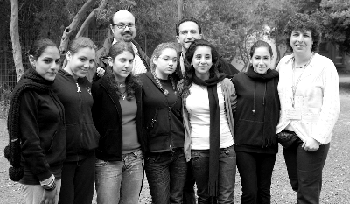By NOGA SHAVIT
I am what you may call an “urban girl.” Nature is not really my thing, and nothing makes me happier than the feel of a city, with its boulevards, cafés, and the pleasant sounds of people and cars running around.
 Still, kibbutzim were always a part of my life. Family and school trips usually included visits to at least one kibbutz; my family had close friends living on kibbutz Shefayim and we spent a good chunk of our time there; and when my husband-to-be and I decided to tie the knot we chose that kibbutz as the location of our wedding reception. Moreover, as an Israeli I was always proud to be a citizen of the only country in the world that can claim the existence of such a fascinating creation: the kibbutz life.
Still, kibbutzim were always a part of my life. Family and school trips usually included visits to at least one kibbutz; my family had close friends living on kibbutz Shefayim and we spent a good chunk of our time there; and when my husband-to-be and I decided to tie the knot we chose that kibbutz as the location of our wedding reception. Moreover, as an Israeli I was always proud to be a citizen of the only country in the world that can claim the existence of such a fascinating creation: the kibbutz life.
Just recently we celebrated the centennial of Tel Aviv, the first Hebrew city. Tel Aviv represented the urban Zionist dream and indeed it turned into a vibrant and modern metropolis, offering an abundance of city-related opportunities.
This year is the time to mark another important Zionist milestone: the kibbutz.
A kibbutz was born
A century ago, Degania, the very first kibbutz, was founded in Eretz Israel. It served as the cornerstone of an emerging pioneer movement that settled along the borders of what later became the State of Israel. Some 280 other kibbutzim were founded since Degania, playing an important role in shaping Israel as a nation and as a society. Yet, the story of the kibbutz was anything but simple.
The ambitious — some would say utopian — vision of just, egalitarian and agricultural collective communities seemed to be collapsing in the 1980s, with many kibbutzim facing severe financial problems and even catastrophes. Israel, which was based on a socialist agenda, became more and more westernized, with concepts of free economy, privatization and business entrepreneurship replacing the older notions of social equality, welfare and controlled markets.
Many young members, seeking their own paths and preferring individualism to collectivism, moved away from their kibbutzim, leaving behind brokenhearted parents and a grave concern for the future of the kibbutzim movement.
Kibbutzim had always considered themselves as the true Israeli pioneers and were rightfully proud of the high number of kibbutznikim serving as IDF combat soldiers. But on top of financial issues and the decline in population, they were blamed for being segregated communities and living comfortably — perhaps too comfortably — indifferent to the hardships of other groups in Israel.
Perhaps the most extreme example of such an approach was Prime Minister Begin’s referral to kibbutzim as “resorts with villas and swimming pools.”

Changing kibbutz life
In the last few years, two interesting kibbutzim-related phenomena are taking place in Israel. On the one hand, many kibbutz members are engaged in public “soul-searching,” reflecting on the positive and negative impacts life on the kibbutz had on their childhood, and ultimately their adulthood. For example, many of them blame the concept of lina meshutefet (children sleeping together with caregivers watching over them, rather than sleeping at home with their parents) as a cruel human experiment causing them a lifelong trauma.
On the other hand, kibbutzim are changing — and flourishing. While the concept of imposed equality is swept aside for notions of communal life, mutual responsibility and structured, yet limited, “togetherness” — lina meshutefet is long gone — more and more young families seek to become kibbutz members, but not everyone is accepted. While “privatized kibbutz” may sound like an oxymoron — making the founders of the kibbutzim movement turn in their graves — it is very much today’s reality.
Tel Aviv and the kibbutzim are two of the many faces of the Zionist dream. Though different, and sometimes even contradictory, ideologies came together to make the State of Israel a dream come true, they all had one thing in common — to ensure a sovereign, sustainable Jewish state.
***
Noga Shavit is the Minneapolis Jewish Federation’s shlicha (Israel emissary). She writes this monthly column, which provides Minnesota Jews with an Israeli perspective on news and culture, with Alisa Warshavsky, the new shlicha of the United Jewish Fund and Council of St. Paul.




















I wouldn’t trade my 6 months on a kibbutz for anything. It’s too bad so few American Jews (let alone Americans) volunteer on kibbutzim.